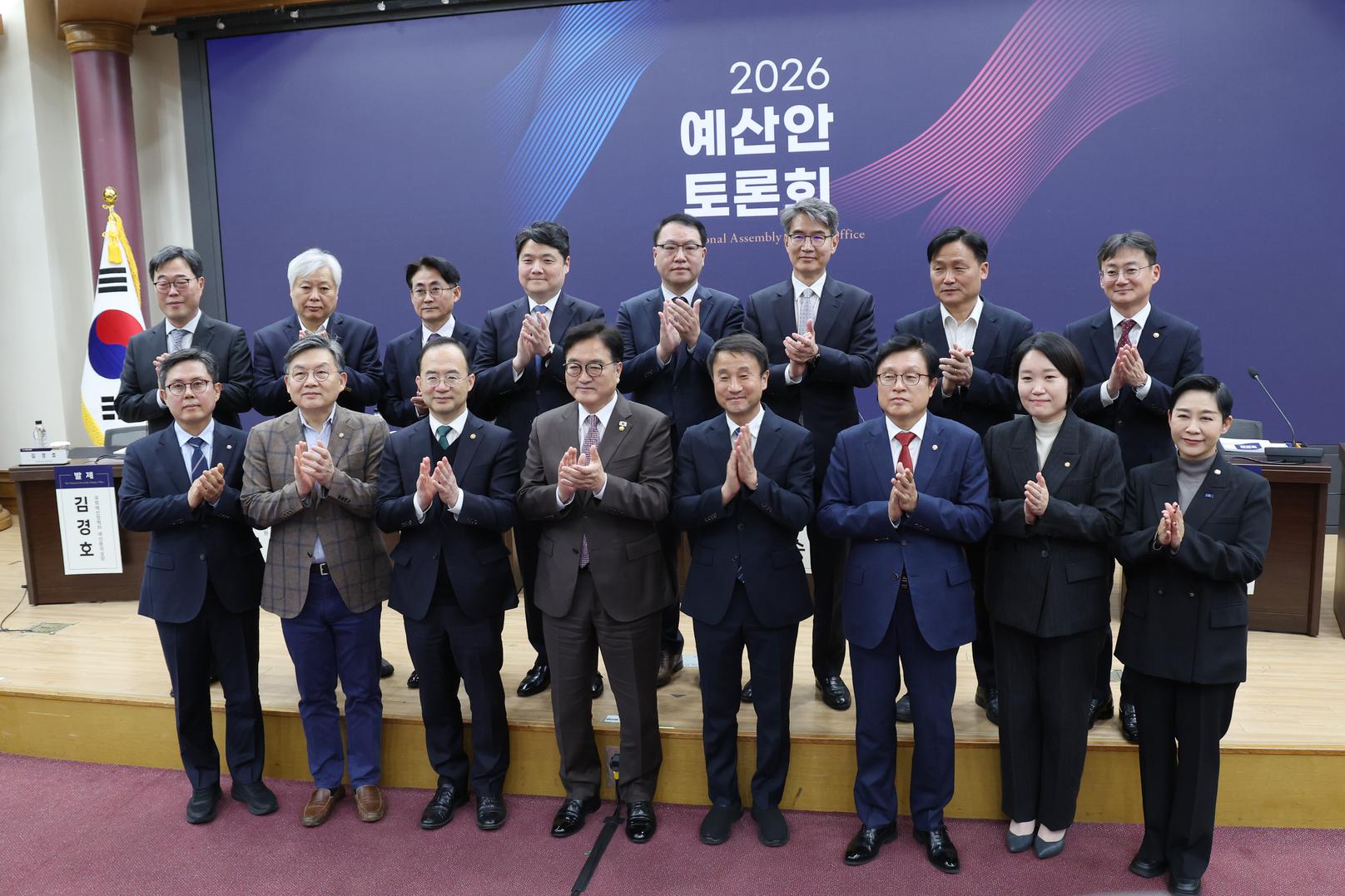| Title | NABO Holds Grand Debate on the 2026 Budget Bill | ||
|---|---|---|---|
| Views | 18 | Date | 2025-11-03 |
|
The National Assembly Budget Office held its Grand Debate on the 2026 on Monday, November 3, at 2 pm in Conference Room 1 of the National Assembly Members’ Building. The debate aimed to establish proper directions for the National Assembly’s examination of the government’s budget proposal.
In his opening remarks, NABO Chief Dongha Chi stated, "This forum will help identify the main issues that need to be discussed during the budget review process, as well as the positions of the ruling and opposition parties." He added, "I hope we can have meaningful discussions about how to use government spending to improve people's lives, ensure important projects are effective, and maintain healthy government finances for the long term." National Assembly Speaker Won-shik Woo highlighted the importance of government spending in his message, saying, "Government finances play a crucial role in supporting people's livelihoods during these challenging times of climate crisis, low birth rates, aging population, and declining local communities." He emphasized the need for "a strong tax base and cutting unnecessary spending so the government can focus resources where they matter most." He also urged both parties to work together to pass a budget that meets public expectations within the legal deadline, noting that this is the first budget prepared by the new government.
Byung-do Han, Chairman of the Special Committee on Budget and Accounts, stressed that "next year's budget focuses on 'recovery and growth,' and we need active government spending to overcome challenges like slow economic growth, regional inequality, and disappearing local communities." He promised that "the committee will carefully review the budget to ensure government spending helps restore the economy and reflects what the people need." The forum was moderated by Professor Jung-su Park of Ewha Womans University. Presentations were given by Byung-seo Yoo, Deputy Minister for the Budget Office at the Ministry of Economy and Finance, and Kyung-ho Kim, Director General of the Budget Analysis Department at NABO. This was followed by panel discussions with National Assembly members So-young Lee, Hyeung-soo Park, and Jae-won Kim from the Special Committee on Budget and Accounts, as well as Woo-hyun Jang, Director of the National Accounting and Finance Statistics Center at the Korea Institute of Public Finance, and Professor Woo-chul Kim from the University of Seoul. Byung-seo Yoo from the Ministry of Economy and Finance explained the 2026 budget plan for "recovery and growth." He said the government plans the biggest-ever spending reform and aims to create positive economic cycles through active government spending and performance-based budget management. He outlined three main investment priorities and their key goals. Kyung-ho Kim from NABO presented his analysis of the 2026 budget plan. He noted that with slow domestic consumer spending and growing international uncertainties, the government plans to maintain increased spending. However, he pointed out a concerning trend: while government debt compared to GDP is decreasing in major developed countries, Korea's debt continues to grow. He said this means Korea needs to work on making its finances more sustainable. He also suggested improvements needed for AI funding, trade-related spending, and policy fund budgets. So-young Lee, rep. of the Democratic Party and vice chairperson of the Special Committee, said she agrees that the government needs to increase spending to restore the economy, especially given recent economic uncertainties and tax revenue shortfalls. She promised to ensure adequate funding for urgent national priorities like AI while checking for wasteful spending, making sure the budget benefits the people and showing bipartisan cooperation. Hyeung-soo Park, rep. of the People Power Party and vice chairperson of the Special Committee, noted that the level of spending cuts in next year's budget is similar to previous years, and Korea's national debt is high compared to similar countries, showing difficult financial conditions. He said that for the budget to prepare for the future rather than just provide short-term stimulus, it needs to reduce total spending, restructure new projects, boldly eliminate duplicate and inefficient programs, ease tax burdens, restore private investment, and ensure long-term financial sustainability. Jae-won Kim, member of the Rebuilding Korea Party, argued that the 2026 budget should be examined to see if it fixes the problems caused by the previous government's extreme budget cuts and selective spending, and whether it truly aims to improve people's lives. She specifically called for new funding to support youth employment in local areas, safety protections for overseas workers, comprehensive support for Koreans living abroad, and increased cultural funding to support the growing K-culture industry. Woo-hyun Jang from the Korea Institute of Public Finance praised the budget as showing the government's efforts to address current challenges. He emphasized that with this active spending approach, it's important to manage and evaluate programs based on evidence and results to ensure the future develops in the right direction. He also noted that now is the time to improve fiscal management systems to make better budget decisions. Finally, Professor Woo-chul Kim from the University of Seoul said that despite increased spending, the 2026 budget lacks real changes in priorities or policy direction. He specifically criticized the absence of aggregate fiscal management and warned that Korea's financial health is approaching a critical point, making it essential to have effective medium- and long-term fiscal plans. 
|
|||